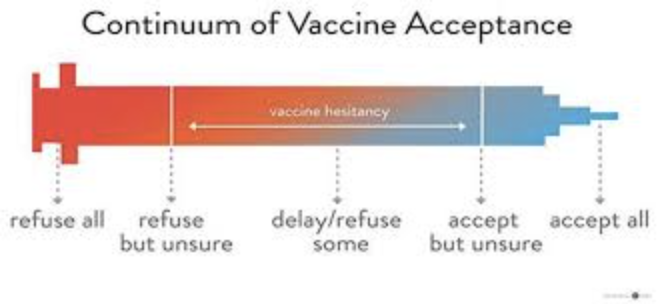I've seen a bunch of people talk about vaccine hesitancy lately but the people doing it seem to be getting some important things wrong.
Firstly, vaccine acceptance is a continuum, as shown in the attached image.
My good friend, @lizditz has a post:
https://lizditz.typepad.com/i_speak_of_dreams/2020/05/vaccine-hesitant-vaccine-fearful-vaccine-refuser-ex-vaxxer-vaccine-abolutionist-anti-vaccine-coming-.html?fbclid=IwAR192jMJVOyt3mC1pWkDO4EX6Pzo__xNc1Q8Q2qzZY-rBRKB62Sxds2bPTw
Firstly, vaccine acceptance is a continuum, as shown in the attached image.
My good friend, @lizditz has a post:
https://lizditz.typepad.com/i_speak_of_dreams/2020/05/vaccine-hesitant-vaccine-fearful-vaccine-refuser-ex-vaxxer-vaccine-abolutionist-anti-vaccine-coming-.html?fbclid=IwAR192jMJVOyt3mC1pWkDO4EX6Pzo__xNc1Q8Q2qzZY-rBRKB62Sxds2bPTw
Most people fall somewhere in the middle. You generally don't see people calling for no vaccines at all, and it's relatively rare for someone to unquestioningly accept all vaccines.
Those people in the middle, they are hesitant.
Messaging about vaccines should focus on them.
Those people in the middle, they are hesitant.
Messaging about vaccines should focus on them.
That said, the people in the far left of that diagram are what some people might call "anti-vaccine."
This term for some reason has invited a bunch of controversy in its use. I don't think there's anything wrong with the term, but I do think many use it incorrectly.
This term for some reason has invited a bunch of controversy in its use. I don't think there's anything wrong with the term, but I do think many use it incorrectly.
Some people have called for the term to be essentially abolished from our lexicon because it carries pejorative connotations and productive dialogue is unlikely the moment it's uttered.
That may well be, but not using the term does not negate the existence of the anti-vax.
That may well be, but not using the term does not negate the existence of the anti-vax.
Don't get me wrong- just like the diagram suggests, true anti-vaxxers are rare, so the term shouldn't be used gratuitously.
There are profiteers who do actively work to sow vaccine disinformation about vaccines to deliberately undermine confidence in them.
There are profiteers who do actively work to sow vaccine disinformation about vaccines to deliberately undermine confidence in them.
There are also some people who frankly just do not want to consider the possibility that a vaccine could have benefits exceeding its risks, regardless of the evidence you make them aware of e.g. the claim that vaccines cause autism- these people are anti-vaccine.
Anti-vaccine would be an apt descriptor for them, and I think it needs to be used with them.
The term suggests an unscientific mindset. It indicates an apathy to public health. It's almost synecdochal for egocentrism and entitlement. It connotes immense, blind privilege.
The term suggests an unscientific mindset. It indicates an apathy to public health. It's almost synecdochal for egocentrism and entitlement. It connotes immense, blind privilege.
For those reasons, the term should precisely not be used in dialogues, especially one-on-one dialogues, with people who do not demonstrate extreme aversion to vaccines for unsound reasons e.g. ignoring that a claimed qualm about them has repeatedly been proved false.
All these people who have misgivings and aren't sure about the COVID-19 vaccines or don't want them now- they are not anti-vaccine. There are myriad reasons why someone could be hesitant to accept a brand new vaccine that don't make them anti-vaccine.
One instance that comes to mind are the persistent and ongoing abuses and iniquities faced by people of color at the hands of the medical system. A great thread here on that matter: https://twitter.com/DrBrittaniJ/status/1334594110888554499?s=20
Also, some people are understandably worried about how fast we got this vaccine- but that's because only the end part of the research was visible to the public. These vaccines are the product of 17 years of meticulous research. https://www.msn.com/en-us/health/medical/dr-peter-hotez-the-covid-vaccine-discovery-was-not-a-4-month-process-it-was-a-17-year-process/vi-BB1bKHP3
They were not rushed; they were expedited:
https://www.deplatformdisease.com/blog/the-vaccines-for-sars-cov-2covid-19-werent-rushed
No corners were cut from the science or safety side. There was a dramatic increase in the speed things could be done by removing unnecessary regulatory steps and unique pandemic circumstances.
https://www.deplatformdisease.com/blog/the-vaccines-for-sars-cov-2covid-19-werent-rushed
No corners were cut from the science or safety side. There was a dramatic increase in the speed things could be done by removing unnecessary regulatory steps and unique pandemic circumstances.
Some people are understandably worried about the possibility of some kind of long-term consequences from the vaccine. That's a reasonable and understandable concern. I did my best to address it here: https://www.deplatformdisease.com/blog/long-term-effects-of-covid-19-vaccines-should-you-be-worried
Recently I've heard more people worried about the possibility of ADE as antibodies wane from the vaccine or from infection, which I think is probably not something we need to worry about: https://www.deplatformdisease.com/blog/what-is-antibody-dependent-enhancement-ade
Naturally, some people have heard about these allergic reactions to the Pfizer vaccine and are worried about the allergic reactions:
https://www.cdc.gov/vaccines/covid-19/downloads/pfizer-biontech-vaccine-what-Clinicians-need-to-know.pdf https://acaai.org/news/american-college-allergy-asthma-and-immunology-releases-guidance-risk-allergic-reactions-pfizer
https://www.cdc.gov/vaccines/covid-19/downloads/pfizer-biontech-vaccine-what-Clinicians-need-to-know.pdf https://acaai.org/news/american-college-allergy-asthma-and-immunology-releases-guidance-risk-allergic-reactions-pfizer
They might be worried about claims of infertility due to these vaccines:
https://www.nytimes.com/2020/12/10/technology/pfizer-vaccine-infertility-disinformation.html
https://www.deplatformdisease.com/blog/are-covid-19-vaccines-going-to-cause-infertility
https://www.nytimes.com/2020/12/10/technology/pfizer-vaccine-infertility-disinformation.html
https://www.deplatformdisease.com/blog/are-covid-19-vaccines-going-to-cause-infertility
Or maybe they're worried about the mRNA vaccine tampering with their DNA (this one, I admit, gives me a headache):
https://www.deplatformdisease.com/blog/no-really-mrna-vaccines-are-not-going-to-affect-your-dna
https://www.deplatformdisease.com/blog/mrna-vaccines-and-covid-19 https://www.deplatformdisease.com/blog/does-sars-cov-2-have-a-reverse-transcriptase
https://www.deplatformdisease.com/blog/no-really-mrna-vaccines-are-not-going-to-affect-your-dna
https://www.deplatformdisease.com/blog/mrna-vaccines-and-covid-19 https://www.deplatformdisease.com/blog/does-sars-cov-2-have-a-reverse-transcriptase
I'm seeing concerns percolating to the rare cases of Bell's palsy observed in the phase 3 trials: https://www.skepticalraptor.com/skepticalraptorblog.php/bells-palsy-and-covid-19-mrna-vaccines-lets-temper-the-concerns/?fbclid=IwAR0LGB7acolFU7ilMvfI1_iBJtbQJxHid9yDEnNgyfwtR4D-63iiv_DLKWU
Anyway, my point is that these concerns are reasonable for a person who doesn't have specialized knowledge of the science and process behind vaccines. Don't label them as anti-vaccine. It's incorrect.
But do get that there absolutely ARE anti-vaccine people.
But do get that there absolutely ARE anti-vaccine people.
Anyway, this is a good guide for engaging the vaccine hesitant: https://twitter.com/mariasundaram/status/1336018501723697153?s=20
Also if you're a healthcare provider you might find this video helpful:

 Read on Twitter
Read on Twitter


